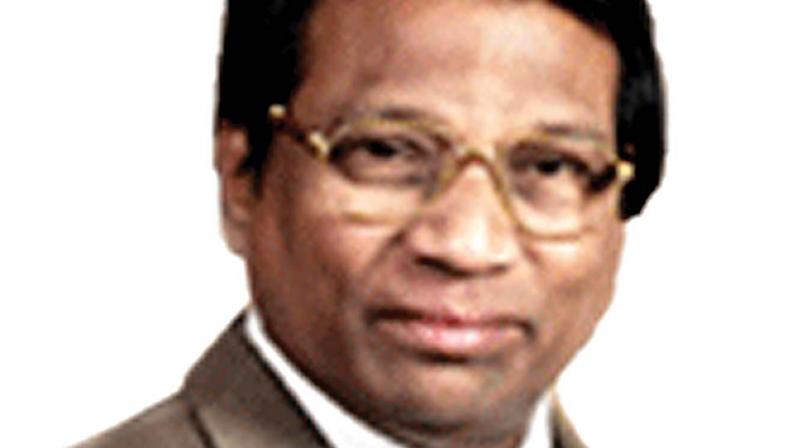Fundamental changes in edu key to india becoming global leader: G Viswanathan

Chennai: Stressing for decontrolling higher education, VIT Chancellor G. Viswanathan said there is need for fundamental changes in the country’s education system to become a global leader in higher education.
In a candid chat with the DC team, he spoke about various issues including the delay in coming out with new education policy and the crisis in medical education, Supreme Court’s direction for getting approval from AICTE for conducting the courses and NIRF rankings.
The excerpts:-
Why do you think there is a delay in announcing new education policy?
The delay is because of various committees. Dr Kasturirangan Committee was scheduled to submit its report in April. But it is yet to submit it. Probably, the new education policy will be announced by August, but there won’t be time to implement it due to elections scheduled next year.
Do you think the NDA government has missed the opportunity to reform the higher education sector?
The government is trying to reform the higher education. I think they will act after the submission of Kasturirangan committee’s report. We need some fundamental changes in the education. The higher education has to be decontrolled; the expenditure on education has to be more than 6 per cent of GDP. The current allocation of 4 per cent is not enough to spend on infrastructure and research. We also need to discontinue the affiliating system. With this affiliation system, we cannot compete with the advanced countries. The colleges need to be in charge of curriculum and conducting examinations. Right now, the colleges are just preparing the students for examination.
How do you see the Supreme Court’s order that says deemed universities should not use the title of universities and brought all the deemed universities under the ambit of AICTE?
AICTE meant for colleges, not universities. While dealing with a case related to engineering courses being offered in distance education mode in four universities, the court has delivered an order for 128 deemed universities in the country. They did not even issue the notice to the deemed universities in the case. The order said we have to go to AICTE for approval and a separate direction said we should not use the word university. Now, we are waiting for the opportunity to present our case.
AICTE is alleging that there is no transparency in deemed universities?
No, all deemed universities are functioning in a transparent manner. UGC is inspecting deemed universities periodically to check the infrastructure and other facilities. AICTE is meant to monitor and supervise affiliated colleges, not universities. Unless they bring a new law, AICTE cannot regulate the universities. They are not asking the questions to central government institutions including the IITs where they give a lot of money. Nowhere in the world are educational institutions exempted from accreditation. Here, the IITs don’t go for any accreditation and in the category wise, they were put above us. So far, no questions have been raised. They have been called institutions of national importance. They are good institutions, I am not denying that. But, all the institutions are institutions of national importance.
Has the introduction of NIRF improved the quality of private educational institutions?
We want the evaluation, but it should be done by an independent agency. The government can be a part of it, but the ranking should not be controlled by the government. The competition should be between government institutions and private institutions, private institutions and private institutions. At present, there is no competition. Who competes with IITs? No committee visits them. We do not know what is happening inside IITs.
Campus recruitment has come down in recent years in many engineering institutions. What is the current recruitment scenario?
As far as VIT is concerned, we continue to have above 90 per cent campus placements. The current situation can be resolved by bringing the industry and academia together. Whatever that is needed in the industry can be taught in the institutions. The curriculum should be updated and whatever practical knowledge is required, students have to go into the industry and learn.
Top executives in the IT industry are saying the recruitment pattern has changed and students are being recruited only in small numbers?
IT companies need to look at the new markets in the developing countries. Manufacturing has to go up in our country to give new job opportunities. It will give foreign exchange. We have enough talented students, but we don’t have enough manufacturing activity. What we have now is one third or one-fourth of China’s. We must be able to compete with them.
Why there is a shortage of MBBS seats in our country? Thousands of students migrating to other countries every year…
MCI (Medical Council of India) allows only 100 seats per medical college. The colleges are also restricted. It has around 400 medical colleges only. Even after the change in the regime, the corruption in medical education still continues. The MCI is under the control of a few persons for the last 20, 30 years. There is a man-made scarcity of MBBS seats.
Otherwise, how do you explain thousands of our students going to abroad to study medicine? Indian students are going to China, Russia, Philippines, Nepal, Bangladesh, Kazkasthan and Ukraine to pursue a medical education. We immediately need to increase the number of medical colleges and the intake of students in our country proportionate to the number of medical aspirants. For 40,000 Neet qualified candidates in Tamil Nadu, we have only around 3,000 seats.
Finally, are you happy with the performance of the central government in the education sector?
Policy changes did not take place. But, we are expecting major changes to be made after the announcement of the new education policy.
At present, we are attracting less than one per cent of international students to our country. We need fundamental changes in the education system to become a global leader in higher education.

